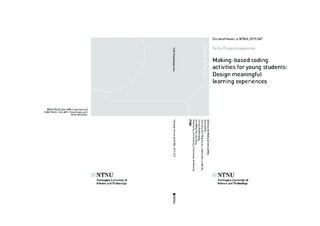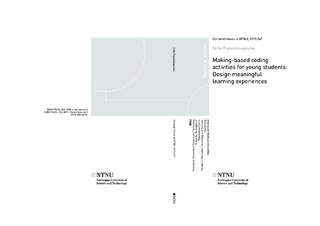| dc.contributor.advisor | Giannakos, Michail | |
| dc.contributor.advisor | Jaccheri, Letizia | |
| dc.contributor.author | Papavlasopoulou, Sofia | |
| dc.date.accessioned | 2019-10-04T10:32:54Z | |
| dc.date.available | 2019-10-04T10:32:54Z | |
| dc.date.issued | 2019 | |
| dc.identifier.isbn | 978-82-326-4091-1 | |
| dc.identifier.issn | 1503-8181 | |
| dc.identifier.uri | http://hdl.handle.net/11250/2620287 | |
| dc.description.abstract | Over the last few years, there is growing evidence supporting the acquisition of 21st- century skills from young students and the introduction of computer science and computational thinking into K-12 education. Making offers new opportunities, as it involves constructing activities and related ways using technological tools to create technology-based meaningful artifacts. In an informal setting, different benefits arise when young students are engaged in coding and making in the context of a learning experience; they are given the opportunity to enhance their understanding of programming concepts, to collaborate with friends, to use their curiosity, imagination, and creativity, and to change their attitudes toward coding. Additionally, during making- based coding activities, when young students focus on the continuous exploratory process of creating something meaningful, pure learning obtains a fertile ground. To overcome various barriers in the learning process (e.g., difficulty, boredom, and confusion), we need appropriately designed and engaging coding activities for young students. Despite the growing research, there is still considerable need to further and systematically investigate those kinds of activities and provide evidence on their appropriate design.
The overall research aims to explore how making can help us design meaningful coding learning experiences for young students, considering that learning via technology is a complex process associated with various aspects of interaction, containing variations in the way young students handle coding tasks and how they manage the learning process. The research context of this PhD work is framed between the fields of Child-Computer Interaction, Technology Enhanced Learning, and K-12 Computing Education.
To this end, this PhD research follows a design-based research approach to understand making-based coding learning experiences for young students through design, exploration, enactment, evaluation, and redesign. Three iterations (cycles), which represent the field studies of this PhD research, were designed and evaluated in total, with participants aged 8-17 years old, using mixed methods. Young students, as participants in our workshops, used a block-based programming environment (i.e., Scratch) and collaboratively created a socially meaningful artifact (i.e., a game).
The resulting contributions include a systematic literature review, producing substantive findings regarding the making approach, and its applications to making-based coding activities. Additionally, this PhD research contributes in the investigation of new methods to evaluate coding activities for young students, as the eye-tracking method was used to pervasively track the gaze of children of young ages in a coding activity. Moreover, focusing on enhancing young students’ engagement and attitudes, together with examining the potential differences in how young students of different ages and genders handle the learning process during coding activities, the next contribution is to provide an improved understanding of the learning process to support young students in making- based coding activities. Finally, this PhD research’s contribution lies in the theoretical grounding of the findings and identification of design principles that can shed light on best practices in the design of making-based coding activities for children. | |
| dc.language.iso | eng | nb_NO |
| dc.publisher | NTNU | nb_NO |
| dc.relation.ispartofseries | Doctoral theses at NTNU;2019:247 | |
| dc.relation.haspart | Paper 1: Papavlasopoulou, Sofia; Giannakos, Michail; Jaccheri, Maria Letizia. Empirical studies on the Maker Movement, a promising approach to learning: A literature review. Entertainment Computing 2016 ;Volum 18. s. 57-78
http://dx.doi.org/10.1016/j.entcom.2016.09.002 | nb_NO |
| dc.relation.haspart | Paper 2: Papavlasopoulou, Sofia; Sharma, Kshitij; Giannakos, Michail; Jaccheri, Maria Letizia. Using Eye-Tracking to Unveil Differences Between Kids and Teens in Coding Activities. I: Proceedings of the 2017 Conference on Interaction Design and Children. Association for Computing Machinery (ACM) s. 171-1
- Is not included due to copyright available at
http://dx.doi.org/10.1145/3078072.3079740 | nb_NO |
| dc.relation.haspart | Paper 3: Papavlasopoulou, Sofia; Sharma, Kshitij; Giannakos, Michail. How do you feel about learning to code? Investigating the effect of children’s attitudes towards coding using eye-tracking. International Journal of Child-Computer Interaction 2018 ;Volum 17. s. 50-60
https://doi.org/10.1016/j.ijcci.2018.01.004 | nb_NO |
| dc.relation.haspart | Paper 4: Papavlasopoulou, Sofia; Giannakos, Michail; Jaccheri, Maria Letizia. Discovering children's competences in coding through the analysis of Scratch projects. IEEE Global Engineering Education Conference, EDUCON 2018 ;Volum 2018-April. s. 1127-1133
- Is not included due to copyright available at
https://doi.org/10.1109/EDUCON.2018.8363356 | nb_NO |
| dc.relation.haspart | Paper 5: Papavlasopoulou, Sofia; Giannakos, Michail; Jaccheri, Maria Letizia. Exploring children’s learning experience in constructionism-based coding activities through design-based research. Computers in Human Behavior 2019
https://doi.org/10.1016/j.chb.2019.01.008 | nb_NO |
| dc.relation.haspart | Paper 6: Papavlasopoulou, Sofia; Sharma, Kshitij; Giannakos, Michail. Coding activities for children: Coupling eye-tracking with qualitative data to investigate gender differences. Computers in Human Behavior 2019
https://doi.org/10.1016/j.chb.2019.03.003 | nb_NO |
| dc.relation.haspart | Paper 7: Sharma, Kshitij; Papavlasopoulou, Sofia; Giannakos, Michail. Coding games and robots to enhance computational thinking: How collaboration and engagement moderate children’s attitudes?. International Journal of Child-Computer Interaction 2019 ;Volum 21. s. 65-76
https://doi.org/10.1016/j.ijcci.2019.04.004 | nb_NO |
| dc.relation.haspart | Paper 8: Kshitij Sharma, Sofia Papavlasopoulou, and Michail Giannakos. Joint Emotional State of Children and Perceived Collaborative Experience in Coding Activities” In Proc. of Conference on Interaction Design and Children. 133-145, Boise, Idaho, US: ACM (2019).
- Is not included due to copyright available at
https://doi.org/10.1145/3311927.3323145 | nb_NO |
| dc.title | Making-based coding activities for young students: Design meaningful learning experiences | nb_NO |
| dc.type | Doctoral thesis | nb_NO |
| dc.subject.nsi | VDP::Technology: 500::Information and communication technology: 550::Computer technology: 551 | nb_NO |

